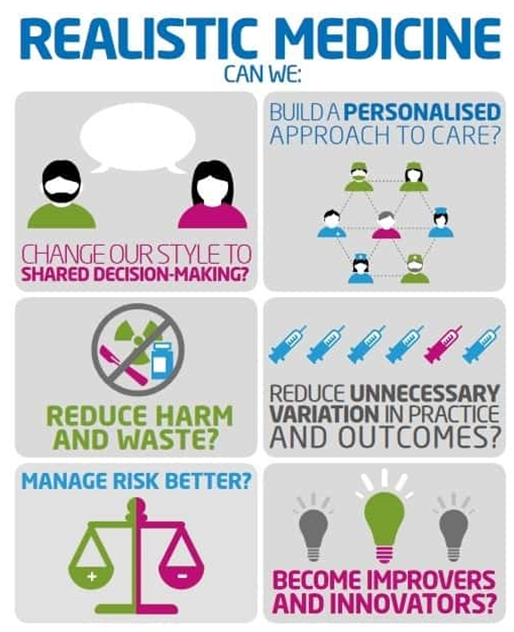Information for patients and carers
Let’s all be realistic about the future of medicine
There’s lots of chat in the healthcare world about Realistic Medicine, but as a patient, do you know what it means?
It's about patients and their healthcare teams "Working together to provide the care that's right for you"
Across Scotland healthcare teams will do this by following a set of six principles:

Shared Decision Making
Shared Decision Making Is about supporting you and your families to feel able to talk about your treatment. In Grampian we encourage you to ask your health care professionals four key questions.




We believe that there are two experts in every health care chat, the health care professional and you, the person we are looking after. The health care professional advising on the choices and you describing what matters to you, asking questions and together making a decision that is right for you.
We try to give you information in a way that is clearer and less confusing, but also gives you more say in what options might work for you.

Building a personalised approach to care
We will ensure you have all the understandable information you need to make an informed choice about your care. We want to move away from the "doctor knows best" culture so that we have a more equal partnership with you in your treatment.
We will listen to you in order to understand what matters to you, putting you at the center of any decisions that are made and creating a personalised approach to your care.
Reducing harm and waste
This principle is not about rationing healthcare or saving money. It's about improving patient care, ensuring that you receive the right and best care and care that is based on evidence and in tune with your preferences. One way we can do this is to ensure we don’t over provide and under provide care, for instance ensuring we do not repeat routine blood tests too much. Antibiotic Resistance over prescribing as an example Antibiotic resistance - NHS (www.nhs.uk)

Reducing unnecessary variation in practice and outcomes
Variation is the difference in the way we provide healthcare. This exists because health systems are complex and everyone has different needs. However, some variation cannot be explained by this this is called unnecessary variation.
Reducing unnecessary variation means using what we have in a way that brings the most benefit to those in our care.
Managing Risk
Realistic Medicine is not about failing to offer treatments. It’s about making sure we help you to make the choices about your treatment and care that are best for you. Talking with you in an open and honest way about any potential risks and benefits of this is important.
Becoming improvers and innovators
We are supporting staff to be innovative (come up with new and different ideas) in the way they work and to keep improving.
To practice Realistic Medicine, we will use the best international evidence, use sound clinical judgment and listen to what matters most to you. We will make sure we use the knowledge and skills of all our staff to support improving the care we deliver.

It's OK to ask
NHS Inform provide a patient information leaflet (pdf) that gives some questions you may want to ask at your next appointment. The leaflet includes a blank space on the back so you can take your own notes.
Audio and British Sign Language (BSL) version:
Visit NHS Inform: It's OK to ask website
If you want further information about Realistic Medicine, you can read more at: www.realisticmedicine.scot
Published: 12/11/2021 16:24




